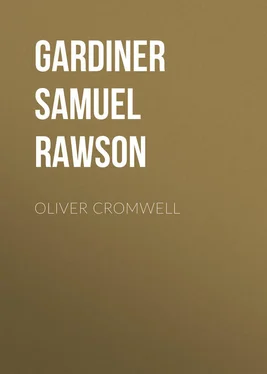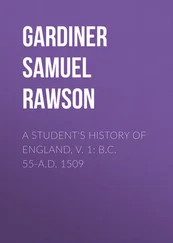Samuel Gardiner - Oliver Cromwell
Здесь есть возможность читать онлайн «Samuel Gardiner - Oliver Cromwell» — ознакомительный отрывок электронной книги совершенно бесплатно, а после прочтения отрывка купить полную версию. В некоторых случаях можно слушать аудио, скачать через торрент в формате fb2 и присутствует краткое содержание. Жанр: foreign_antique, foreign_prose, на английском языке. Описание произведения, (предисловие) а так же отзывы посетителей доступны на портале библиотеки ЛибКат.
- Название:Oliver Cromwell
- Автор:
- Жанр:
- Год:неизвестен
- ISBN:нет данных
- Рейтинг книги:3 / 5. Голосов: 1
-
Избранное:Добавить в избранное
- Отзывы:
-
Ваша оценка:
- 60
- 1
- 2
- 3
- 4
- 5
Oliver Cromwell: краткое содержание, описание и аннотация
Предлагаем к чтению аннотацию, описание, краткое содержание или предисловие (зависит от того, что написал сам автор книги «Oliver Cromwell»). Если вы не нашли необходимую информацию о книге — напишите в комментариях, мы постараемся отыскать её.
Oliver Cromwell — читать онлайн ознакомительный отрывок
Ниже представлен текст книги, разбитый по страницам. Система сохранения места последней прочитанной страницы, позволяет с удобством читать онлайн бесплатно книгу «Oliver Cromwell», без необходимости каждый раз заново искать на чём Вы остановились. Поставьте закладку, и сможете в любой момент перейти на страницу, на которой закончили чтение.
Интервал:
Закладка:
On November 25 Cromwell appeared in Parliament to urge on the one thing immediately necessary, the forging of an instrument by which the King might be ruined in the field. The existing military system by which separate armies, to a great extent composed of local forces, and therefore unable to subordinate local to national objects, had been placed under commanders selected for their political or social eminence, had completely broken down. So well was this recognised that, two days before Cromwell's arrival at Westminster, a committee had been appointed without opposition to 'consider of a frame or model of the whole militia'. It was perhaps to assist the committee to come to a right conclusion that, upon his arrival at Westminster, Cromwell indignantly assailed Manchester as guilty of all the errors which had led to the deplorable result at Newbury. Manchester was not slow in throwing all the blame on Cromwell, and it seemed as if the gravest political questions were to be thrust aside by a personal altercation. So angry were the Scottish members of the Committee of both kingdoms, a body which had recently been appointed to direct the movements of the armies, that they won over the Presbyterian leaders, Essex and Holles, to look favourably on a scheme for bringing an accusation against Cromwell as an incendiary who was doing his best to divide the King from his people, and one of the kingdoms from the other. At a meeting held at Essex House the Scottish Earl of Loudoun asked the English lawyers present whether an incendiary who was punishable by the law of Scotland was also punishable by the law of England. The English lawyers threw cold water on the scheme, Whitelocke asking to see the evidence on which the charge was founded, whilst Maynard declared that 'Lieutenant-General Cromwell is a person of great favour and interest with the House of Commons, and with some of the Peers likewise, and therefore there must be proofs, and the most clear and evident against him, to prevail with the Parliament to adjudge him to be an incendiary'. Neither Whitelocke nor Maynard was eager to bell the cat.
Cromwell replied by a renewed attack on Manchester's inefficient generalship. Yet it was not in accordance with the character of the man who had stopped the headlong rush of his squadrons at Marston Moor to allow a great public cause to be wrecked by personal recriminations. On December 9 Zouch Tate, himself a strong Presbyterian, reported from a committee which had been appointed to consider the questions at issue between the two generals, 'that the chief causes of our division are pride and covetousness'. It is immaterial whether Tate had or had not come to a previous understanding with Cromwell to damp down the fires of controversy which threatened to rend the Parliamentary party into warring factions. What was of real importance is that Cromwell followed with an admission that, unless the war was brought to a speedy conclusion, the kingdom would become weary of Parliament. "For what," he added, "do the enemy say? Nay, what do many say that were friends at the beginning of the Parliament? Even this, that the members of both Houses have got great places and commands and a sword into their hands, and, what by interest of Parliament, and what by power in the army, will perpetually continue themselves in grandeur, and not permit the war speedily to end, lest their own power should determine with it. This I speak here to our faces is but what others do utter behind our backs." Then, after calling for the more vigorous prosecution of the war, and advising that all charges against individual commanders should be dropped, he proceeded to express a hope that no member of either House would scruple to abandon his private interests for the public good. Later in the day, Tate gave point to Cromwell's suggestion by moving that so long as the war lasted, no member of either House should hold any command, military or civil, conferred on him by Parliament. The idea struck root. It satisfied those who misdoubted Essex and Manchester, as well as those who misdoubted Cromwell. That Cromwell was in earnest in proposing to exclude himself is evident. The majority in both Houses was Presbyterian, and if the so-called Self-Denying Ordinance brought in to give effect to Tate's proposal by refusing to members of either House the right of holding commands in the army or offices in the State had been passed in the form in which it was drawn up, nothing short of a repeal of that ordinance could have enabled him to command even a single troop.
That a door was left open was entirely the fault of the House of Lords in rejecting this ordinance on January 13, 1645. By this time both parties in the Commons were of one mind in pushing on an ordinance for a new model of the army, from which it would be easy to exclude peers, whether the Self-Denying Ordinance were passed or no. On January 21 the Commons named Fairfax as General and Skippon as Major-General of the new army. The post of Lieutenant-General, which carried with it the command of the Horse, was significantly left open. No legislation now barred the way to Cromwell's appointment, but the House thought it desirable to make their action in the matter dependent on the line finally taken by the Lords. On February 15 the Lords passed the New Model Ordinance. A few days later, the negotiation with the King which is known as the Treaty of Uxbridge, came to an end, and Parliament was now committed to the design of meeting Charles in the field with an army commanded by professional soldiers, and withdrawn from local and political influences. In such an army nothing more would be heard of the dangers of success which had loomed so large before the eye of Manchester. Apparently to save the Parliamentary officers from the indignity of tendering the resignation of their commissions, a new Self-Denying Ordinance was passed on April 3, by which members of either House were discharged from their military or civil posts within forty days afterwards. There was nothing to prevent the reappointment of Cromwell on the one hand, or of Essex or Manchester on the other, if the two Houses should combine in doing so.
CHAPTER II.
THE NEW MODEL ARMY AND THE PRESBYTERIANS
The New Model Army had been accepted by both Houses and by both parties in either House, because in no other way could the difficulties of the situation be met. The failure of the negotiations at Uxbridge had convinced the Presbyterians – at least for the moment – that Charles would give no help towards the settlement of the nation on any basis that their narrow minds could recognise as acceptable, and if the war was to be continued, what prospect was there of success under the old conditions? Nevertheless, the creation of the New Model was, in the main, Cromwell's work. Men are led by their passions more than by their reason, and if Cromwell had continued his invectives against Manchester, he would have roused an opposition which would have left little chance of the realisation of the hopes which he cherished most deeply in his heart. All through the discussion he had shown not only a readiness to sacrifice his own personal interests, but a determination to avoid even criticism of the actions of his opponents in all matters of less importance, provided that he had his way in the one thing most important of all. Without a word of censure he had left the Presbyterians not only to negotiate with Charles, but to pass votes for the establishment of intolerant Presbyterianism in England. The skill with which he avoided friction by keeping himself in the background, whilst he allowed others to work for him, doubtless contributed much to his success. It revealed the highest qualities of statesmanship on the hypothesis that he was acting with a single eye to the public good. It revealed the lowest arts of the trickster, on the hypothesis that he was scheming for his own ultimate advantage. As human nature is constituted, there would be many who would convince themselves that the lower interpretation of his conduct was the true one.
Читать дальшеИнтервал:
Закладка:
Похожие книги на «Oliver Cromwell»
Представляем Вашему вниманию похожие книги на «Oliver Cromwell» списком для выбора. Мы отобрали схожую по названию и смыслу литературу в надежде предоставить читателям больше вариантов отыскать новые, интересные, ещё непрочитанные произведения.
Обсуждение, отзывы о книге «Oliver Cromwell» и просто собственные мнения читателей. Оставьте ваши комментарии, напишите, что Вы думаете о произведении, его смысле или главных героях. Укажите что конкретно понравилось, а что нет, и почему Вы так считаете.












